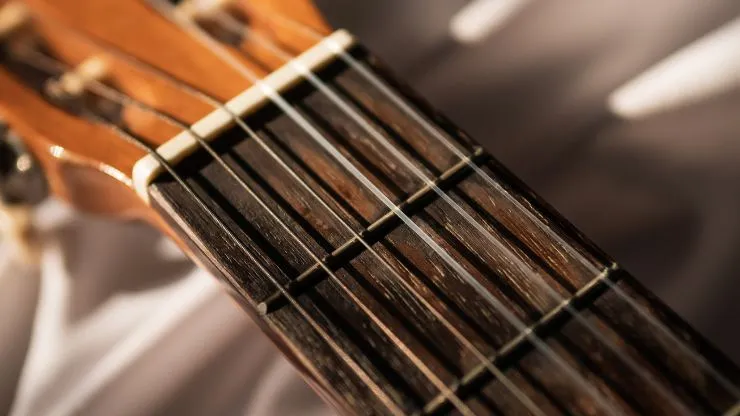Along with being a common fretboard option, rosewood is a popular choice for acoustic guitars and features in some of the very best instruments that money can buy. In this article, we’ll tell you everything you need to know about rosewood tonewood - and why a rosewood guitar could be the one for you.
What Is Rosewood?
Rosewood is a hardwood timber sourced from trees belonging to the Dalbergia genus. It gets its name from the rose-like scent the wood emits when cut or sanded. Physically, rosewood is recognisable for having rich reddish colouring and dark veins. And beyond instrument making, it’s been a valuable wood for hundreds of years, popular in furniture, flooring, and ornamentals.
What Are the Advantages and Disadvantages of Rosewood Guitars?
| Pros | Cons |
|---|---|
| Rich and full tone | Less strong mid-range performance than mahogany |
| Excellent low and high-end performance | Heavy |
| Good resonance | More expensive than most tonewoods |
| Very durable | Not the easiest wood to work with |
| Eye-catching appearance |
Rosewood Variations
There are at least 20 variations of true rosewood, all with different colour properties and uses. In addition, many other kinds of wood from outside the Dalbergia genus are also called rosewood because of their similar hardness, density, and colourings. Historically, the most prized rosewood for guitar-making was Brazilian rosewood. This wood features incredible low-end clarity, bell-like trebles, and a beautiful exotic appearance. However, due to overharvesting, Brazilian rosewood is now considered endangered, and its trade is severely restricted. Nowadays, Dalbergia Latifolia, or East Indian rosewood, is the go-to variety for guitar making.
Why Is Rosewood a Popular Tonewood?
With its incredible density and hardness, rosewood is highly resistant to water and wood rot, making it a solid and stable choice. Musically speaking, rosewood is considered one of the warmest and richest tonewoods available. Deep lows, sparkly highs and a scooped mid-range make for a unique and highly sought-after sound. It also boasts excellent resonance and volume, making it perfect for live and studio use.
What Uses Does Rosewood Have in Guitars?
As rosewood is very dense, it’s far too heavy to use in solid bodies. In electric guitars, rosewood mainly features on the fretboard, where the wood’s hardness and snappy sound qualities can work their magic. But it’s in acoustic guitars where the qualities of rosewood can really come out and play. When used in the back and sides of an acoustic, the addition of rosewood helps create a nuanced and rich sound.
Are Rosewood Guitars Expensive?
Due to its desirable sound qualities and attractive appearance, rosewood typically only appears in the back and sides of high-end acoustic guitars. Deluxe Gibson models sometimes use rosewood, and it appears in top-of-the-range offerings from Martin and Taylor. While its appearance on fretboards is more expected, rosewood still isn’t common on budget models.
Is Rosewood Sustainable?
Essentially no – due to decades of overharvesting, true rosewood is now considered endangered. In fact, by value, rosewood is more trafficked than ivory, rhino horn and big cats put together. While strict regulations on the trade and transport of rosewood instruments were relaxed in 2019, it is still protected worldwide and in short supply. The most vulnerable variety, Brazilian rosewood, remains off the table in most cases.
Are Rosewood Guitars Durable?
Rosewood is one of the toughest woods around - hard, dense, and with excellent water and rot-resistant qualities. This stuff is built to last and might even sound better as it ages. If you opt for a rosewood guitar, you should be able to enjoy it for years to come. Rosewood fretboards are not quite as tough as maple, but they can still take a lot of abuse. And thanks to their darker colour, they don’t show damage as easily as maple.
Are Rosewood Guitars Easy to Maintain?
All guitars require some degree of maintenance over the years to keep them singing at their best. But thanks to the physical strengths of rosewood, there isn’t much you need to worry about. It’s worth learning the best way to clean a rosewood fingerboard, and you might want to apply a little oil once a year to keep it in top condition. Other than that? Just worry about enjoying your instrument and getting your chops up to speed.
Is Rosewood the Best Tonewood for Guitars?
Which wood you think is best is very objective. However, rosewood will always be in the discussion when it comes to the top tonewoods for acoustic guitars - many of the leading high-end acoustics, which sell for thousands, use rosewood. In acoustic and electric guitars, rosewood (along with ebony and maple) has been part of a ‘holy trinity’ of fretboard tonewoods for decades. While this dominance is ending thanks to sustainability issues, rosewood remains one of the most desirable tonewoods for any fretboard.
Rosewood Alternatives
Due to the previously discussed problems with sustainability, rosewood is undoubtedly harder to come by nowadays. But the good news is that there are new, more sustainable tonewoods in use by major manufacturers that are virtually identical in performance, such as pau ferro, laurel, and granadillo.
There are also plenty of options if rosewood isn’t quite for you tonally. For a more mid-range sound, mahogany is the obvious choice, or if you’re after a brighter tone with more high-end, then consider koa or maple.
Find Your Rosewood Guitar
Now that you know everything there is to know about rosewood tonewood, let’s get looking for your guitar! Use our Finder tool to enter your search parameters and pick out your ideal rosewood guitar.

